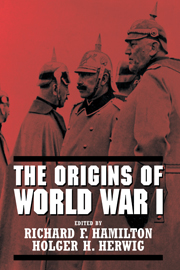Book contents
- Frontmatter
- Contents
- List of Tables and Maps
- Contributors
- Acknowledgments
- 1 World Wars: Definition and Causes
- 2 The European Wars: 1815–1914
- 3 Serbia
- 4 Austria-Hungary
- 5 Germany
- 6 Russia
- 7 France
- 8 Great Britain
- 9 Japan
- 10 The Ottoman Empire
- 11 Italy
- 12 Bulgaria, Romania, and Greece
- 13 The United States
- 14 Why Did It Happen?
- 15 On the Origins of the Catastrophe
- Appendix A Chronology, 1914
- Appendix B Dramatis Personae
- Appendix C Suggested Readings
- Index
10 - The Ottoman Empire
Published online by Cambridge University Press: 05 August 2012
- Frontmatter
- Contents
- List of Tables and Maps
- Contributors
- Acknowledgments
- 1 World Wars: Definition and Causes
- 2 The European Wars: 1815–1914
- 3 Serbia
- 4 Austria-Hungary
- 5 Germany
- 6 Russia
- 7 France
- 8 Great Britain
- 9 Japan
- 10 The Ottoman Empire
- 11 Italy
- 12 Bulgaria, Romania, and Greece
- 13 The United States
- 14 Why Did It Happen?
- 15 On the Origins of the Catastrophe
- Appendix A Chronology, 1914
- Appendix B Dramatis Personae
- Appendix C Suggested Readings
- Index
Summary
Among the countries that entered the Great War before the end of 1914, the Ottoman (or Turkish) Empire was destined to play a major role in shaping its course and eventual outcome. Despite its economic backwardness and financial penury, this polyglot state of about 22 million people put up a remarkable war effort against the entente powers and forced them to divert large numbers of troops and significant naval forces to the newly opened Turkish theaters of war, thus reducing Allied pressure on Germany and her Austro-Hungarian ally for long periods of time. Moreover, by barring Allied shipping through the Black Sea Straits (the Bosphorus and the Dardanelles), the Ottoman armed forces contributed in a major way to Russia's supply shortages and thereby hastened the collapse of the tsarist regime in 1917. In the end, of course, the Ottoman Empire itself collapsed under the strains and stresses of the Great War. Its defeat in the fall of 1918 opened the way for drastic political changes throughout the Middle East: Between 1919 and 1926, a host of new states were to emerge in that region, among them the new Republic of Turkey; Syria and Lebanon (under French mandate); Iraq, Palestine, and “Transjordania” (under British mandates); as well as the future kingdoms of Saudi Arabia and Yemen. The establishment of a “Jewish homeland” in Palestine, as promised by Great Britain in the Balfour Declaration of 1917, would soon become a source of major friction in the Middle East and elsewhere whose repercussions are still being felt today, almost ninety years after the Ottomans marched into the last war of their history.
- Type
- Chapter
- Information
- The Origins of World War I , pp. 337 - 355Publisher: Cambridge University PressPrint publication year: 2003
- 2
- Cited by

